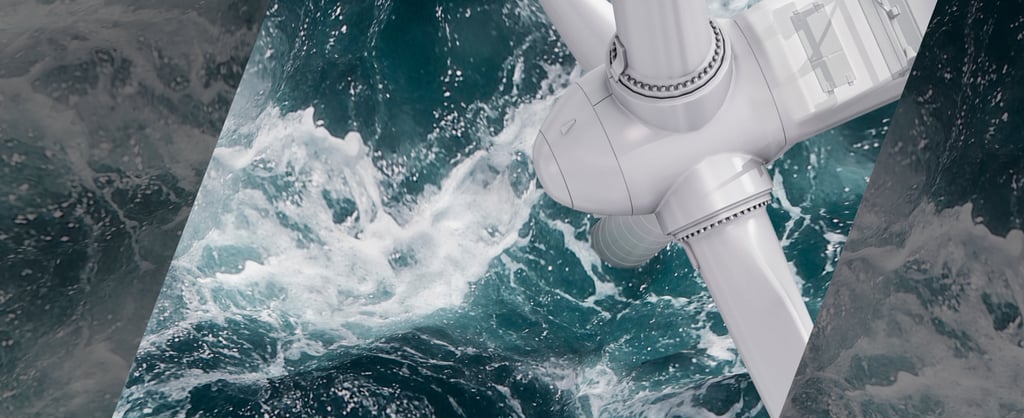"Momentum doesn't come from targets alone. It comes from confident action - even in the face of uncertainty."
The energy transition is no longer a future ambition. Even in the unstable political landscape we live in, it's happening right now - in offshore wind farms breaking ground, in Carbon Capture and Storage (CCS) projects reaching final investment decisions, and in organisations redesigning operations around lower-carbon models. Leaders and stakeholders across the sector are no longer asking why anymore. They're asking how.
How do we accelerate progress in a high-risk, fast-changing environment? How do we secure funding, demonstrate credibility, and deliver the scale needed - all without compromising resilience?
In short: how do we continue to turn ambition into momentum?
For organisations serious about net zero, this is the inflection point. It's not just about meeting climate commitments - it's about using assurance to embed resilience, unlock business value and accelerate the transition.
From my work with clients across the energy sector, one thing is clear: companies making real progress are those managing holistic risk with the same rigour as they manage ambition. And that's where assurance plays a critical role.
The risk behind the reward
The scale of investment in the energy transition is vast - and so are the stakes. Whether it's a leading renewable energy developer or a nuclear innovator, organisations are contending with:
- Rapidly evolving regulations
- Intense scrutiny from investors and insurers
- Complex, multi-tiered and ever-changing supply chains
- Pressure to demonstrate integrity, not just intent
LRQA polling shows that while many organisations are committed to net zero, only 21% feel confident they have the data needed to report progress credibly. The biggest barriers? Risk and complexity - exactly the challenges assurance is designed to address.
One insight that's becoming increasingly clear is that the regulatory landscape is no longer a backdrop - it's a moving target. Companies are navigating jurisdictional requirements, voluntary schemes, and an uptick in climate disclosure laws. Without deep understanding of these schemes and structured risk management, it's difficult to move forward with confidence.
The complexity is especially apparent in cross-border projects. A company rolling out a fleet of onshore wind installations across multiple markets may be subject to different permitting timelines, local content rules, emissions accounting methods and labour standards. These differences can introduce hidden risk that only becomes visible once costs rise or delays occur.
This is where assurance acts as a stabiliser. By systematically identifying, managing and mitigating risks - from safety and compliance to performance and environmental and social impact - organisations can move decisively.
Assurance also supports scenario planning. Rather than reacting to policy changes or stakeholder scrutiny, risk-aware organisations can build resilience into their operations. They're not just protecting against downside risk - they're increasing their capacity to move forward with confidence, knowing they've done the work to prepare.
Why risk-led strategy builds momentum
"Assurance isn't a brake on progress - it's a catalyst for it."
When you understand your risks, you unlock the ability to act faster. That may sound counterintuitive - but we see it play out time and time again. Clients who integrate assurance into their transition strategies are better equipped to secure funding, build stakeholder trust and scale effectively.
For example, in offshore wind - one of the most capital-intensive areas of the transition - financial backers are increasingly looking for robust due diligence, supply chain integrity and credible verification. Without these assurances, timelines stall. With them, projects advance.
This is something we see consistently across the energy sector: assurance enables momentum not by removing uncertainty altogether, but by helping organisations manage it intelligently.
Risk-led strategy also helps organisations remain agile. As policies shift and stakeholder expectations evolve, those with structured governance and transparent data are better positioned to adapt. That adaptability is becoming a core competitive advantage.
We've also seen this apply across newer technology types. In emerging nuclear formats like SMRs, for instance, regulatory scrutiny is high and project designs often evolve rapidly. A proactive approach to risk - embedding governance into the design process itself - helps teams avoid rework, accelerate licensing and bring greater confidence to the investor conversation.
And in solar, where speed to market is a key differentiator, the same holds true. Where developers embed compliance and supply chain due diligence from the outset, timelines become clearer and procurement friction drops. The result? Fewer delays, stronger relationships and more resilient project economics.
The credibility to scale
One area where I'm seeing real traction is in how organisations are using assurance to build trust in their net zero strategies. The landscape of management systems is evolving rapidly - moving beyond traditional frameworks toward integrated approaches that embed sustainability and climate considerations into core operations.
The regulatory environment is driving this shift. Updates to foundational standards like ISO 9001 and ISO 14001 are now integrating sustainability and climate change considerations directly into quality and environmental management. Meanwhile, new standards like the upcoming ISO 14060 Net Zero framework (launching 2026/27) and ISO 42001 for AI management systems are addressing emerging challenges - including how AI adoption impacts energy consumption and climate commitments.
This integrated approach is becoming essential for credibility. With regulations like the Corporate Sustainability Reporting Directive (CSRD) and the Corporate Sustainability Due Diligence Directive (CSDDD) coming into force, structured governance and reliable data are now regulatory requirements, not optional extras.
This is where assurance makes a difference. From advisory services and supply chain audits to inspection, certification and verification, assurance provides a structured approach to identifying, managing and communicating risk. Certification validates the integrity of management systems. Verification confirms the accuracy of specific claims - whether that's GHG emissions data, product footprints or supplier disclosures. But assurance goes further: it underpins everything from site inspections and compliance reviews to lifecycle analysis and governance audits. This breadth is what gives regulators, investors and partners the confidence that progress is not only planned - it's real, risk-managed and repeatable.
Assurance is also becoming a gateway to financial incentives. Whether organisations are applying for tax credits, government grants or climate-linked funding, the ability to demonstrate verified action can directly influence eligibility and approval. That's why we're seeing more clients invest in assurance not just to manage risk - but to unlock value.
Crucially, credibility also drives internal momentum. In complex organisations, misalignment can stall progress just as quickly as regulation. But where data is independently verified and governance is embedded at every level, decision-making becomes faster and more focused. Investment committees approve capital with confidence. Procurement teams know what to prioritise. Engineering teams act without second-guessing compliance.
In today's energy transition, credibility is becoming a currency. And for companies aiming to lead - not just comply - assurance is how they prove they're on the right path.
The supply chain multiplier
"Momentum is fragile when it rests on unverified claims."
A final - and often under-recognised - piece of the momentum puzzle lies in the supply chain. The energy transition depends on complex networks of suppliers, many of whom are navigating their own decarbonisation journeys and may also be new to the sector.
But gaps in supplier capability, quality or ESG standards can delay or derail major projects. We're seeing more organisations extend assurance beyond their own operations to actively manage supply chain risk. That might mean auditing fabrication yards, verifying emissions claims, undertaking social audits or assessing suppliers against bespoke standards.
The message is clear: visibility isn't enough anymore - organisations need verifiable confidence across increasing areas of risk including not just technical, safety, quality and environmental but also social and cyber. That's what enables scalable, repeatable progress.
This is especially true in sectors where equipment is specialised, and lead times are long. In wind, Hydrogen and solar projects, even a single substandard component can set back commissioning by weeks or months. In nuclear, unverified supplier data can raise red flags during regulatory review. In both cases, the ability to trace quality and compliance across the supply chain can be the difference between momentum and delay.
Final thoughts: progress through confidence
The energy transition is a defining challenge of our generation. But it's also an opportunity to rethink how we operate, collaborate and grow.
Targets matter. But they won't drive progress alone. Momentum comes from confidence - the confidence to act in uncertainty, to meet scrutiny head-on, and to scale what works.
That confidence is what assurance delivers.
And for those of us helping shape the future of energy, that might be our greatest lever yet.











